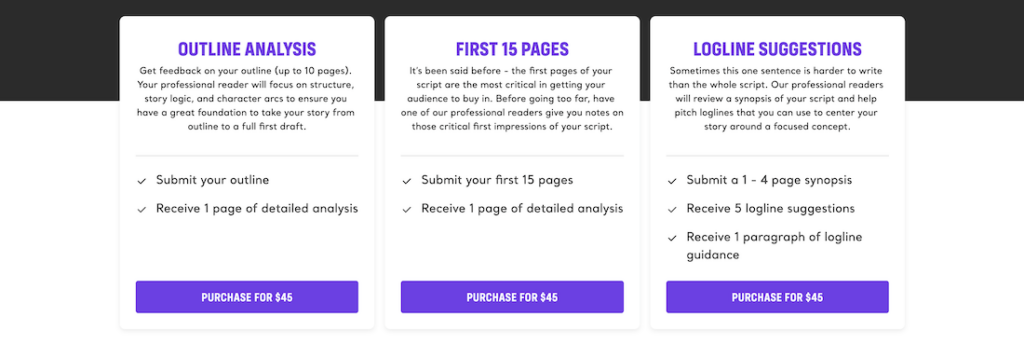If you’re a screenwriter, there are three things that you will both dread and cherish in your screenwriting journey — screenplay feedback, script notes, and script coverage. All of them are necessary tools within the screenwriting trade. Here we will delve a little deeper to explain the differences between the three to help guide you through these industry necessities and teach you how to utilize each of these tools to become both a better screenwriter and a better collaborator within the film/TV/Streaming industries.
Got a great feature? Enter it into the ScreenCraft Feature Screenplay Competition!
What is Script Coverage?
Script coverage plays a vital role in developing feature films and television shows. It is also a valuable learning tool for screenwriters who want to hone their craft and develop their unique voice.
There are two kinds of script coverage — script consultant script coverage for screenwriters and studio script coverage.
Read More: An In-depth Look at Script Coverage
Script Consultant Coverage for Screenwriters
Script consulting coverage is the most comprehensive form of coverage, usually commissioned by screenwriters to obtain feedback from script consultants they have hired. This type of coverage can be significantly longer than studio coverage (see below), often spanning several dozen pages. The content encompasses all aspects of the script, including story structure, pacing, character development, plot, subplots, themes, and character arcs.
Various sources offer script coverage services, including screenwriting educational websites, blogs, and screenwriting platforms that allow writers to share their scripts with industry professionals. Additionally, screenwriters can pay for script coverage when submitting their screenplays to contests, competitions, and fellowships, usually at an additional cost to entry fees.
Read More: Explaining All the Different Types of Script Coverage
Studio Script Coverage
Studio script coverage is a detailed report that studios, networks, streamers, or production companies commission to assess a screenplay’s potential. This evaluation is vital in helping decision-makers determine whether or not to invest in a project. Studio coverage can be conducted by an in-house script reader (company script readers including interns, assistants, junior executives, and professional script readers/story analysts). Some studios hire external script consultants with expertise in writing engaging and informative screenplay coverage.
Aside from studio coverage, agency or management company coverage is written to break down the screenplay’s relevance to the company’s clientele vision. The analysis helps the agents and managers determine the type of clients they want to represent — and find the best scripts for their acting and directing clients by narrowing down the options and selecting the best fit for their client’s needs.
It’s important to note that studio script coverage is exclusively for internal use, and the notes and analysis are not shared with the screenwriter. The report aims to provide feedback and insights to help the studio, network, production company, agency, or management company make an informed decision about the project’s future and its relevance to film packaging, TV/Streaming development, and clientele.
Read More: What You Should And Shouldn’t Expect From Script Coverage
What Are Script Notes?
Script notes typically originate from established studios, production companies, agencies, and management companies. These company-level notes and reactions are generated through the studio script coverage process. This involves a designated reader who evaluates the screenplay and applies the company’s needs and wants.
Furthermore, these types of script notes are also provided by a variety of sources, including producers, development executives, directors, actors, and sometimes production staff such as line producers. These notes are intended to provide objective feedback and achieve specific objectives set by the studio or network. This may include the inclusion or exclusion of particular scenes, sequences, story arcs, and character arcs.
The ultimate objective of these notes may vary, depending on the needs and wants of the studios and networks. Examples include:
- They may aim to make the script more marketable.
- They may need the project to be more accessible to a particular target audience.
- They may feel the script needs to better suit a specific star.
- They may seek to better realize the creative vision of the attached producer or director.
Can Screenwriters Reject Script Notes?
In most cases, notes given by studios or companies are not open for negotiation. Typically, receiving these notes means you are either under contract for a writing assignment or your original spec script is undergoing its first contracted rewrite.
If you are under contract, implementing these notes is part of your job, which you are being paid for. These notes reflect the needs and wants of the company, producer, director, and lead actors. As the hired screenwriter, you should defend your opinions, but choosing your battles wisely and being prepared to compromise is essential. That’s the key to successful collaboration between the screenwriter and those they work under.
If you push back too strongly and go against the direction your employers want to take the script, you risk being replaced due to creative differences. Therefore, it’s essential to strike a balance between advocating for your ideas and being flexible to meet the needs of the project.
Read More: How the Development Process Works
What Is Screenplay Feedback?
Screenplay feedback originates from scenarios that don’t encompass you working under contract or consideration for potential contracts, including input from:
- Writing groups and peers
- Mentors
- Commissioned script consulting coverage services
Receiving feedback on your screenwriting can be a valuable tool for improving your work.
Can Screenwriters Reject Screenplay Feedback?
Screenwriters need to remember that feedback is just an opinion, and you can decide what to do with it. This is especially true if you’re not being paid to rewrite and are not under any contractual obligations.
But also remember that you sought out this feedback in the first place. Whether it came from a script consultant, writing group, mentor, or simply friends and family, you opened yourself up to receiving criticism. Therefore, it’s essential to remain open to any feedback that comes your way.
That said, no feedback is absolute. Just because someone suggests changes to your script’s characters, storyline, or other elements doesn’t mean you have to implement them. However, if you receive the same feedback repeatedly, it may be worth considering changes or exploring why those issues keep arising.
When considering feedback, just ensure any changes align with your vision for the script. If the feedback makes sense and can help you improve the script while staying true to your vision, then it’s worth considering. However, if it goes against your goal, it’s okay to push it aside.
In the end, the choice is ultimately yours. You can decide what feedback to apply and what to ignore. Remember that while feedback can be a valuable tool for improving your writing, it’s not the only factor to consider. Screenwriters need to become self-reliant because when you get to the point where you are hired to write or rewrite a screenplay, you can’t rely on screenplay feedback from others. You make the decisions and then collaborate with your employers to make necessary changes and tweaks.
Read More: Why Development Notes Matter
Ken Miyamoto has worked in the film industry for nearly two decades, most notably as a studio liaison for Sony Studios and then as a script reader and story analyst for Sony Pictures.
He has many studio meetings under his belt as a produced screenwriter, meeting with the likes of Sony, Dreamworks, Universal, Disney, and Warner Brothers, as well as many production and management companies. He has had a previous development deal with Lionsgate, as well as multiple writing assignments, including the produced miniseries BLACKOUT, starring Anne Heche, Sean Patrick Flanery, Billy Zane, James Brolin, Haylie Duff, Brian Bloom, Eric La Salle, and Bruce Boxleitner, the feature thriller HUNTER’S CREED, and many produced Lifetime thrillers. Follow Ken on Twitter @KenMovies and Instagram @KenMovies76.
CHECK OUT OUR PREPARATION NOTES SO YOU START YOUR STORY OFF ON THE RIGHT TRACK!
The post Script Coverage, Notes and Feedback: What’s the Difference? appeared first on ScreenCraft.
Go to Source
Author: Ken Miyamoto






